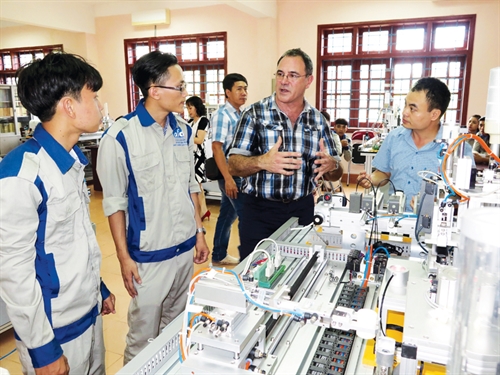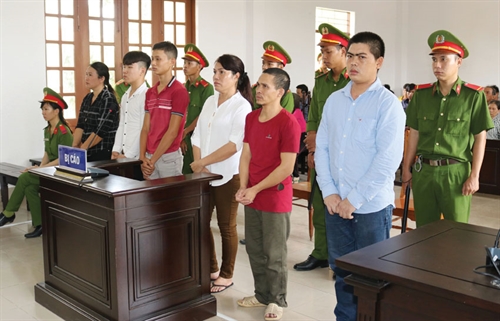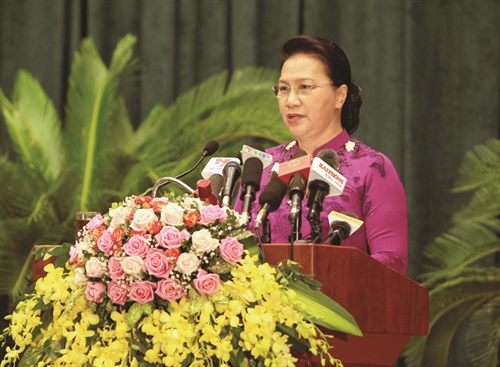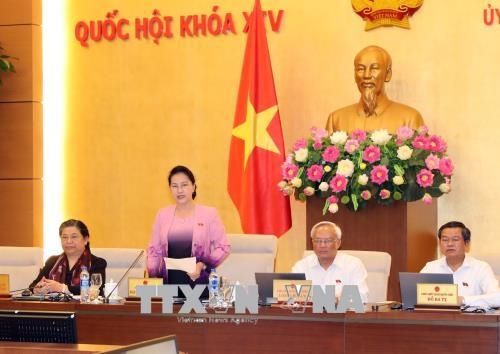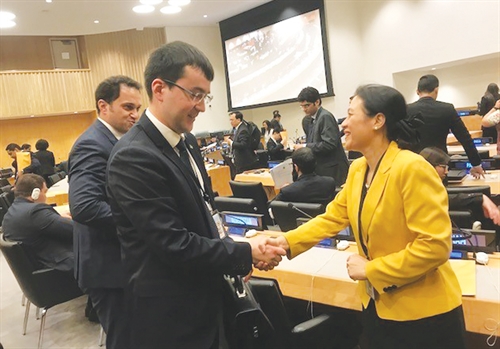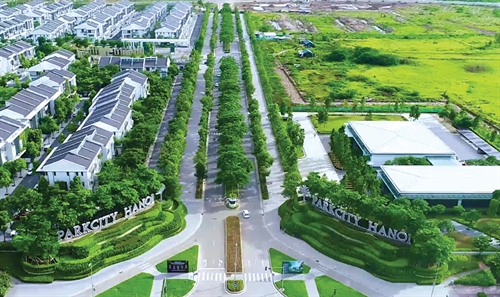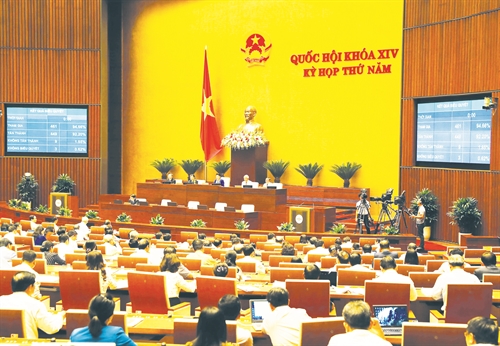Environmental protection tax rates for petrol and oil will increase from the beginning of 2019, according to a resolution on environmental protection tariff adopted at the 27th meeting of the National Assembly (NA) Standing Committee that concluded on September 20 after nine working days.
As per the resolution, the tax rates for petrol, except ethanol, will rise to VND 4,000 per liter from the current VND 3,000 per liter. Meanwhile, the ceiling rate of VND 2,000 per liter will apply to diesel oil, kerosene, fuel oil, lubricating oil and grease. Coal will be subject to the tax rate of VND 15,000 per ton.
Tax rates will also be adjusted for other commodities like herbicides, termiticides, plastic bags, and germicides restricted from use.
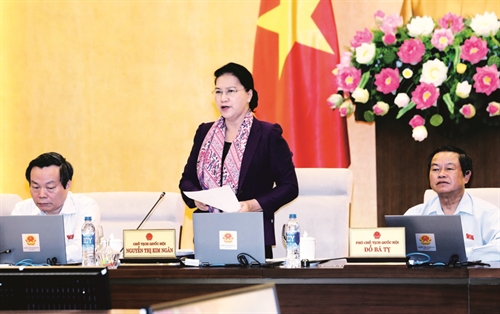 |
| National Assembly Chairwoman Nguyen Thi Kim Ngan addresses the closing meeting of the National Assembly Standing Committee’s 27th session on September 20 __Photo: Trong Duc/VNA |
The resolution aims to heighten the responsibility and awareness of organizations and individuals about environmental protection and limit the use of polluting fossil fuels. It is also intended to encourage production and use of substitute products such as biofuels that are environmentally friendly and guarantee the national interests in the context of the country’s deep integration when import duty rates are gradually reduced under international commitments and oil prices fluctuate.
According to a verification report of the NA’s Committee on Financial and Budgetary Affairs, the application of new tax rates from the next year will not result in the rise of consumer price indices in 2018, thus enabling the Government to adjust inflation in the subsequent year while minimizing adverse impacts on the economy and people’s lives.
In her closing speech, NA Chairwoman Nguyen Thi Kim Ngan said that during the meeting, the NA Standing Committee discussed nine draft laws concerning public investment, tax administration, planning, corruption prevention and control, and execution of criminal judgments, to name a few.
The Committee also heard the Government’s report on the implementation of the NA’s Constitution, laws and resolutions, and other reports on the settlement of complaints and denunciations, prevention and combat of crimes and violations, and anti-corruption work in 2018.
It examined the plan on organizing a vote of confidence for persons holding positions elected and ratified by the NA at the coming NA session.
The Committee also approved the scheme to consolidate on a pilot basis the Office of the NA deputies’ delegation, Office of People’s Council and Office of People’s Committee into the Office of the NA deputies’ delegation, People’s Council and People’s Committee in 10 provinces and centrally run cities, namely Bac Kan, Da Nang, Ha Giang, Ha Tinh, Lam Dong, Quang Ninh, Thai Binh, Ho Chi Minh City, Tay Ninh, and Tien Giang. Other localities are encouraged to follow this pilot model of consolidation.
Concerns over quality of legal documents
The NA Standing Committee’s members expressed their concern over the quality of legal documents and the instability and irrelevance of the legal system.
“The unstable legal system has impacts on people, enterprises and investors,” head of the NA’s Committee on Judicial Affairs Le Thi Nga said.
She said that agencies ask for amendments any time they face obstacles in implementing laws. But the difficulties, in many cases, do not come from the laws themselves.
Important legal documents have not been issued, while several draft laws do not meet quality standards in terms of preparation and content, she said.
NA Vice Chairman Phung Quoc Hien said that a law is about one field but, in fact, it impacts many other sectors.
With the draft amendments to the Law on Education, for example, new policies proposed in the draft require more spending from the state budget which is running dry.
“The legal system at the moment is relatively comprehensive. But enforcement is not well implemented,” Hien said.
He added that every year there are thousands of irrelevant legal documents issued. The punishments for people who approved the issuance of the documents are not severe enough.
Poverty reduction assessed not sustainable
The rate of poor households in the country is expected to drop to under 6 percent at the end of this year from 6.7 percent in 2017, according to the Government’s report presented at the meeting.
The report said the poverty rate in poor districts has decreased at an average 5.43 percent a year, meeting the set target. Relapse into poverty has been controlled with a downward trend, as shown in the rates of 0.13 percent in 2016 and 0.1 percent in 2017. Ten localities have maintained their record of no relapse into poverty.
However, the reduction in poverty rate is unsustainable, and the gap among regions and population groups has not been narrowed, particularly that between the northern mountainous and Central Highlands regions and other regions.
Furthermore, despite the rapid reduction of poverty rate in poor areas, the rate remains at a high level, 50 percent and even 60-70 percent in some extremely poor localities. More than half of the poor households are of ethnic minority groups, and the average income of ethnic minority families is only two-fifths of the national average level.
Another report of the NA’s Committee on Social Affairs also showed that the outcomes of poverty reduction efforts are unsustainable. It said a dozen of provinces reported a noticeable increase (of 0.03 percent or more) in relapse into poverty, and the number of households falling back into poverty is equivalent to 5 percent of those escaping poverty. At the same time, for every four households escaping poverty, one new household falls into poverty. The rate is even higher in localities hard stricken by storms and floods.
Head of the NA’s Ombudsman Committee Nguyen Thanh Hai questioned why the rates of poverty reduction are different among areas despite the same mechanisms, policies and resources, and why most of the poor districts are in the northern mountainous region.
In response, Labor Minister Dao Ngoc Dung said one of the main causes for the increase in poverty and relapse into poverty is the impacts of frequent storms and floods, with examples like Yen Bai, Lao Cai and Lai Chau provinces, and most recently Thanh Hoa province. Another reason is the division of households to form new ones, he said.
The participants proposed the NA and NA Standing Committee to allocate sufficient funding for the national target program on sustainable poverty reduction in the next two years, and provide more money to carry out some urgent tasks in this realm, especially in addressing housing and health care issues for the poor.
NA Chairwoman Ngan affirmed that the State has never cut budget for social security in any circumstances. However, in order to solve the outstanding problems in poverty reduction, it is necessary to clarify the responsibility of local administrations in the work, and pinpoint the reason why many households do not want to get rid of poverty, she said.
The top legislator also stressed the need to multiply effective models in poverty reduction, and promote communication campaigns to raise the awareness of both society and local administrations about self-reliance in escaping poverty.
Agenda of coming NA session
According to a tentative schedule presented at this meeting, the NA’s sixth session will open on October 22 and last through November 20.
The NA will spend 12 days out of the total 22.5 days on lawmaking work, and nine days on supreme oversight activities and other important matters.
At this session, the NA is expected to pass nine laws concerning corruption prevention and control, the People’s Public Security force, special amnesty, higher education, Vietnam’s coast guard, and protection of state secrets, among others.
At the same time, the NA will discuss five draft laws, including the revised draft Law on Education, and finalize them for passage at the seventh session.
The NA leader said the draft law on special administrative-economic units will not be submitted to the coming session as it has been transferred to the Government for further study and collection of feedback.
Also, the draft Law on Prevention and Control of Liquor and Beer Harms and the draft Law on Public Administration will not be considered at this session because they do not satisfy the prescribed conditions on preparation progress and content.
The top legislator said a NA deputy will have no more than seven minutes to present his opinions while the time for presenting an examination report must not exceed 15 minutes.
Regarding personnel work, Ngan said the proposal to dismiss the Minister of Information and Communications and the proposal on the appointment of the new minister will be submitted to the NA for approval at this session.-
